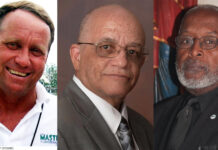CONTRIBUTION BY THE
ON A BILL FOR AN ACT TO AMEND
THE SUPREME COURT ACT.
30th April, 2008
Mr. Speaker, I rise on behalf of the great people of Carmichael to move the Second Reading of a Bill for an Act to amend the Supreme Court Act.
With your leave, Mr. Speaker, I wish to thank the children of the Gerald Cash Primary School for presenting me with this beautiful certificate on Monday. I had a wonderful morning reading Dr. Seuss to the Children of Grade 1, and I want them to know that I will treasure my certificate that they gave me.
In now turn to the Bill at hand.
Mr. Speaker, the government has brought this very straightforward amendment to the Supreme Court Act. It is an amendment which should ordinarily pass with the support of both opposition and government.
It is not controversial.
It does not adversely affect anyone.
The amendment can only assist in improving the legal system.
Accordingly, I invite all members to support it.
Mr. Speaker, in 1996 Parliament passed the Supreme Court Act with a view to consolidating the law as it related to the Supreme Court and the administration of justice. For the twelve years since the Act was passed, its provisions have served as a valuable guide for the conduct of legal proceedings in the Supreme Court.
Our justice system has its challenges, Mr. Speaker. All legal systems do; but, Mr. Speaker, as Bahamians we can all take pride in the manner in which the Bahamian legal system has functioned for so long, and I salute the many dedicated employees at the Supreme Court who continue to toil each day to ensure the fair application of justice for all.
Mr. Speaker, the foundations for our Supreme Court are entrenched firmly in the Supreme law of the land, the Constitution.
One of my disappointments, Sir, is that too few Bahamians take the time to read the Constitution of the Commonwealth of The Bahamas, and to familiarize themselves with the rights which that document guarantees them.
Mr. Speaker, our Constitution is a living document. It provides that the Bahamas should be a sovereign democratic state. It also provides for the protection of our fundamental rights and freedoms, such as the right to life; the right to be protected from inhuman treatment; the right to be protected from slavery and forced labour; the right to be protected from arbitrary arrest; and for freedom of religion; freedom of movement and freedom of expression.
The Bill of Rights in our Constitution embodies many other rights, Sir. As Bahamians we should all take the time to read the Constitution and to know what these rights are.
Mr. Speaker, Article 28 of the Constitution provides that where any of our constitutionally protected rights have been, is being or is likely to be contravened, then we may seek relief in the Supreme Court.
That Sir, is one reason why the Supreme Court is so important. That is why it is to be respected. And that is why a seemingly simple amendment such as the one before us today continues to be significant.
Mr. Speaker, in addition to Judges, the Supreme Court has a Registrar, Deputy Registrars and an Assistant Registrar.
The Registrar, Deputy and Assistant Registrar, Sir, are judicial officers who are appointed in the same manner as a Judge of the Supreme Court, that is by the Governor General acting on the advice of the Judicial and Legal Services Commission. The Prime Minister and members of the Executive have no say in the appointment of these judicial officers, and in a free and democratic country, Mr. Speaker, that is how we would all want it to be.
We all watched the news from Pakistan last year, Mr. Speaker, where it was reported that the President decided to fire the Chief Justice. It was also reported that some 60 senior judges were fired and put under house arrest in Pakistan last year because the President feared that they would overturn his election. In fact, the Chief Justice of Pakistan was just released from house arrest on 24th March of this year after being confined for 5 months.
That cannot happen in the Bahamas, Mr. Speaker, because the Prime Minister and the Executive have no power to remove or exercise disciplinary control over a judicial officer. The Constitution vests that power in the Governor General acting on the advice of the Judicial and Legal Service Commission.
So, Mr. Speaker, the Bahamas is no Banana Republic, and Bahamians do not want it to be that way. And so Registrars and Judges can feel free to hear matters between the government and the citizen and rule against the government if the evidence so warrants without being concerned that a politician can cost them their job.
That is the type of protection that all Bahamians cherish, Mr. Speaker.
Mr. Speaker, I said earlier that the Registrar of the Supreme Court is a judicial officer. This is because he exercises all of the powers of a Judge in Chambers except as it relates to criminal matters and matters that affect the liberty of the subject. Indeed, Sir, it would be strange if any civil matter gets to a Supreme Court hearing without the Registrar making many rulings. Matters such as Summons for Directions, Summary Judgments, Default Judgments, and a large number of pretrial matters are heard by the Registrar acting in his capacity as a Master of the Court.
This amendment, Mr. Speaker, simply gives the Assistant Registrar the right to hear matters in the same manner as the Registrar and Deputy Registrar do. Some might argue that the amendment is unnecessary, Mr. Speaker, because the Assistant Registrar currently sits and hears matters in the capacity of a Master. However, Mr. Speaker, the exercise of the power as it exists currently is dependent on the exercise of the Registrar’s discretion with the approval of the Chief Justice. There is no reason why the Assistant Registrar should not have the power to hear matters as of right by virtue of office without depending on the exercise of the Registrar’s discretion and the approval of the Chief Justice.
By itself, Mr. Speaker, this amendment is not going to speed up the work of the Court. It is not an answer to all of our problems in the judicial system; but it is one step in the right direction. The Registrar, Deputy Registrars, and Assistant Registrar hear hundreds if not thousands of applications each year, and so moving forward when Assistant Registrars are appointed they need not depend on the exercise of the Registrar’s discretion before they can act as Masters of Court.
Mr. Speaker, this amendment has to be seen as the first step in reforming the processes of the Supreme Court.
As more space becomes available, Sir, provision will have to be made for the appointment of more Assistant and Deputy Registrars to reduce the time it takes to have applications heard. Consideration will also have to be given to creating a complete separation between legal and administrative duties so that the Registrar is not burdened with hearing matters while still being responsible for the administrative supervision of the courts.
There is much work to be done, Mr. Speaker, and those of us who hold political office have a duty to lead constructively.
One of the ways that we can do this, Sir, is to stand above the political rhetoric, and to help Bahamians fully appreciate the working of the legal process.
In this regard, Mr. Speaker, I agree with the Honourable member for Fox Hill that Judges are not above criticism. I believe that the Judges will also agree with him that by virtue of their positions they are open to criticism.
What is wrong and unfair, Mr. Speaker, is the situation that we encounter when Judges and even juries now are being unfairly criticized because their decision is not the one that we wanted.
Mr. Speaker, a jury verdict is the decision of a group of ordinary Bahamian men and women who have heard the evidence in a case and made a decision, based on the law that the judges directed them on. It is the operation of our democratic ideals at its highest level, and in the absence of evidence of wrongdoing, we undermine the democratic process when we seek to criticize them for doing their duty as they saw it simply because we disagree with the final decision.
Mr. Speaker, we are fortunate to have a Chief Justice of the caliber of Sir Burton Hall, who has served with distinction in the Office of the Attorney General, in the Supreme Court and in the Court of Appeal. He has been a mentor to many in the profession, and it must have pained him to recite the matters he set forth in a speech at last year’s third annual Crime Prevention Seminar on the Powers and Role of the Judiciary. His speech is reproduced in the 2007 Annual Report of the Supreme Court, and I wish to quote a portion of it here today:
“The nature of litigation is that it compels parties, even claimants, to participate in a process that they would prefer to have avoided and the culmination of the process leaves one, sometimes both, of the parties unsatisfied. This residual resentment often translates into the dissatisfied party feeling that he did not receive “justice”, not because of the demerits of his case, but because the fountain of justice had, somehow, been polluted by the opposing side.
It is the unenviable task that Judges have in modern societies to do their jobs in this, often hostile, environment. In our region, being comparatively small countries which function more as large villages, we bear the added burden of living in cultures where popular wisdom holds an article of faith that all services for which the State is responsible (and the legal system is not exempt) is dispensed on the basis of “who you know”.
I cite a personal example. If you were to “Google” my name, you would see a “blog” posted 29 October 2004:
“Sir Burton Hall a Disgrace to Justice”
Sir Burton Hall is a disgrace to justice in the Bahamas. The foolish…judge…has once again embarrassed the Bahamas judicial community by reducing the sentence of a brutal murderer to manslaughter, citing a silly technicality that really has no bearing on the man’s guilt…he may have been drinking before he murdered the girl…
This is not the first time that Burton Hall has made decisions usually attributed only to bribe-taking corrupt judges. The important clue here is to find out who Moss is related to, that got him this ticket off death row. Then trace that relationship to Sir Burton and one might even find corruption in the Judiciary.
The unidentifiable writer does not bother to point out to the readers of his blog (which, because it is posted on the internet, potentially includes every person on planet Earth with access to a computer) that I sat as one of a panel of three judges in the Court of Appeal who handed down a unanimous decision stating our reasons, as we must, for the decision which the Crown did not seek to appeal”.
We must, therefore, Sir, temper our criticism with reason and in this regard, Mr. Speaker, I wish to identify myself with the words of Dame Joan Sawyer, the President of the Court of Appeal, as published in the Nassau Guardian on January 4th, 2008 that as long as the mode of dealing with crime and criminal activity is one of seeking scapegoats or casting blame, any real solution will remain elusive.
Dame Joan went on, Mr. Speaker to say:
“What is required, I think, is that each man, woman, boy, girl, examine him or herself honestly and consider whether he or she has in any way contributed to, or condoned or encouraged any breach of the law either with regard to themselves or other persons. And, where any of us find that we may have so acted, we should then set out daily, hourly, minutely, to undo any harm we may have done by neglect, and to do any right we have failed to do and try not to repeat the wrongdoing of the past”
That’s the challenge for all of us as, Mr. Speaker. We have to determine that there is a duty for us to respect and obey the Orders or rulings that come from a legally constituted body no matter how much we disagree with that Order or ruling.
In this regard, Mr. Speaker, I commend you for your distinguished and dignified leadership in this place, and I encourage you to remain steadfast as you carry out your duties in this place; and Mr. Speaker as encouragement to you and a reminder to all of us, I wish to share with you the words of Australian Prime Minister Rudd at the House of Representatives on 12th February, 2008 as he welcomed, Mr. Harry Jenkins to the post of Speaker:
“You will be aware that the role you are taking on today will not be easy. Many of us are aware of the great story of the first Speaker of this House, Sir Frederick Holder, who, in 1909, rather famously exclaimed, ‘Dreadful, dreadful’ in response to the events on the floor of the chamber and then collapsed dead on the floor. It has been a common practice and, I think, a good one in this House to remind all incoming Speakers of Sir Frederick’s demise.
While you, Mr. Speaker, look to be in excellent health, it would be remiss of me not to pass this on to you.
Over the years, this House has seen Speakers of many different dispositions. Each of them helped shape the tone and conduct of the parliament in their times. One thing is certain: at some point all wished for a better behaved House. Let us hope we can all do better. I do not believe in promising the undeliverable, because responsibility for delivering a better behaved House lies with each and every one of us as members.
Of course we are going to have robust debates in this place-that is the heart and soul and nature of the vibrant Australian democracy, which we know and love and cherish.
There will be passion on display-that has been our way; that is the Australian way. It is written very much into our folklore, our past, our history and our future.
But as we express these convictions with passion, let us also show restraint. It is an immense privilege to be part of a democratic parliament where we can express our opinions-a privilege not shared universally across our world-the beliefs we hold to be dear, and express our goals without fear of retribution, except perhaps the retribution delivered at the ballot box.
We owe as much to our society, Mr. Speaker, because the very legitimacy of our office depends on respect for the institutions of our society.
So, Mr. Speaker, I want to close my contribution today by commending those in the Carmichael community who continue to provide exemplary leadership. In particular, Mr. Speaker, I wish to commend Dr. Myles Munroe and Bahamas Faith Ministries International for the posture that they have taken on leadership in our community.
Last month, Bahamas Faith Ministries International hosted over a thousand children from 33 of our schools to a Kid’s Leadership Day. They have created a “Culture Up” programme, to teach our children the importance of them being leaders, and the central theme is that each child needs to understand that he was born to lead.
Mr. Speaker, we can all stand here and speak of our support for the rule of law; we can criticize the courts or the government; but if we are truly leaders we also have a duty to send a message that we intend to obey the law; and in this place that means obeying the rulings of the Speaker. It starts with us, Sir, and we send the message to our children. Bahamas Faith Ministries International is teaching them that they were born to lead, and I wish to commend Dr. Munroe and all of his pastors for continuing to lead in Carmichael.
I so move.








